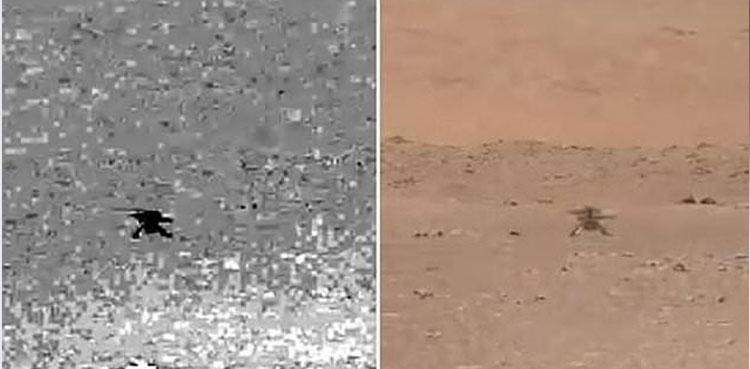NASA has revealed a new ‘motion filter’ video of the history-making Ingenuity helicopter flying on Mars showing just where the dust travelled around the craft.
The video, shot by the Mastcam-Z camera on the Perseverance rover, reveals plumes of Martian dust made by Ingenuity upon takeoff and landing.
After the successful flight on Monday April 19, NASA named the airfield that hosted the takeoff the ‘Wright Brothers Field’ in honour of the aeroplane inventors.
NASA’s Jet Propulsion Laboratory (JPL) say they will now be pushing the 4lb helicopter ‘to the limit’ in a series of future flights between now and early-May.
In the new video, a ghostly ‘cut-out’ of the helicopter is visible, which is an artefact related to the digital processing involved in creating the short clip, says NASA.
The flight, according to NASA, was flawless. It was a gentle take off, with a little push by the wind when it climbed higher altitudes, but was very steady with just the tiniest bounce upon landing.
Having motion filter footage showing the dust around the craft can help NASA as it looks to construct larger and more advanced Mars helicopters in the future.
Along with the epic video, shared side-by-side with the motion capture version, Ingenuity also snapped an image showing the moment before its landing legs touched back down after what is being called a ‘Wright Brothers moment.’
While soaring through the thin atmosphere of Mars, Ingenuity snapped 30 pictures per second to help it monitor its own path, and one image shows the moment before its legs are about to meet the ground.
The 19 inch tall and 4ft diameter wide helicopter completed the first powered, controlled flight on another planet on Monday, and will attempt to complete four more test flights involving further distances and higher altitudes in the next two weeks.
That first historic flight involved the craft firing up its rotors to 2,500 rpm, lifting up to 10ft, hovering for 30 seconds and then landing safely on the surface.



Leave a Comment